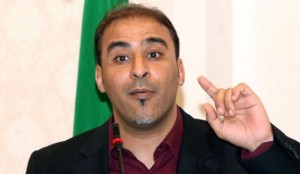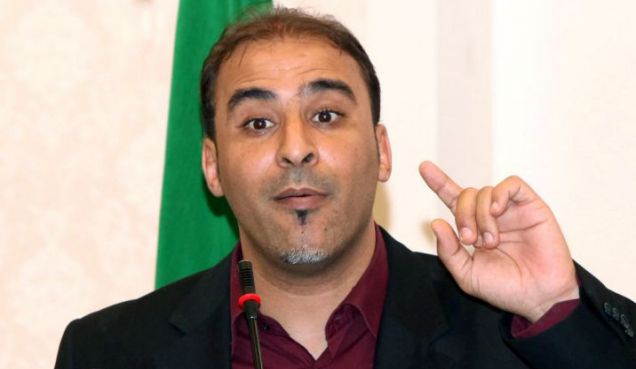
Tripoli (AFP) – Libyan officials on Saturday announced the arrest of Mussa Ibrahim, the last spokesman of Moamer Kadhafi, after warning the country was still not fully “liberated” one year after the strongman’s death.
“Mussa Ibrahim was arrested at a checkpoint in the town of Tarhuna,” read a brief statement sent to journalists. “(He) is being taken to Tripoli where he will be handed over to the pertinent authorities to begin questioning.”
Deputy Prime Minister Mustafa Abu Shagur confirmed the news on Twitter: “Criminal Mussa Ibrahim was arrested and he is now on his way to Tripoli.”
Rumours of the arrest of Ibrahim, the public voice of the Kadhafi regime in its final months, and that of other personalities of the former regime said to be fleeing from the besieged town of Bani Walid had swirled since the morning.
His capture coincides with the first anniversary of the death of his patron, Kadhafi, who was captured and killed in his hometown of Sirte on October 20, 2011, following eight months of bloody conflict.
“The campaign to liberate the country has not been fully completed,” Mohammed Megaryef, the head of Libya’s national assembly, said in remarks broadcast overnight on state television.
Megaryef, president of the democratically elected General National Congress, gave a sombre assessment of the post-Kadhafi period.
He pointed to “delays and negligence” in the formation of a professional army and police force, and the failure to disarm and integrate former rebels into state institutions.
The national assembly chief stressed that delays in reactivating and reforming the judiciary had also hampered national reconciliation in what marks a critical transition period for the oil-rich nation.
“This situation has created a state of discontent and tension among different segments of society and contributed to the spread of chaos, disorder, corruption and weakness in the performance of various government agencies,” said Megaryef.
This benefited “remnants of the former regime which have infiltrated the organs of the state, maybe even its leadership, and are plotting against the revolution with the help of others who are abroad.”
Libya’s top official reserved his sharpest criticism for the town of Bani Walid, which has been the scene of deadly clashes this week, and endorsed military operations there.
“Bani Walid’s misfortune is that it has become a sanctuary for a large number of outlaws and anti-revolutionaries and mercenaries,” Megaryef said.
Forces linked to the army, the majority of them former rebels, encircled the hilltop town this month in a bid to bring to justice the men who kidnapped and allegedly tortured Omran Shaaban, an ex-rebel credited with capturing Kadhafi.
Shaaban died of his injuries last month after the authorities brokered his release.
An attack on Bani Walid that left 11 people dead on Wednesday raised questions over the chain of command with Libya Shield officers saying they had received orders to advance, a claim that was refuted by the chief of staff.
Bani Walid’s military commander, Salem al-Waer told AFP that “there was heavy shelling” for a second day on Saturday and that the forces surrounding the town were advancing.
“The authorities gave the militias a green light to exterminate us,” said Salem al-Waer, who leads the largest armed group of the town, urging an intervention by the United Nations and the West to save civilians.
Megaryef in his speech stressed that the operations underway “do not target this brave city or its people, rather they target culprits, wanted people, the accused and infiltrators.”
“This is not a genocide or ethnic cleansing as erroneously claimed by some. It is a campaign to restore legitimacy,” he said.
Many elders and commanders there have vowed to repel any advance by “lawless militias” on the town and call into question the neutrality of the national army, which is still in the process of being formed and leans on former rebels.
Meanwhile, gunmen attacked a military barracks in a suburb west of Tripoli, according to a military official and witnesses, who were unable to identify the assailants and gave no report of casualties.


